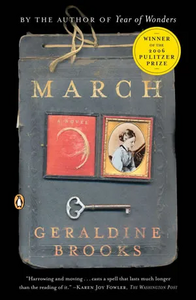You need to sign in or sign up before continuing.
Take a photo of a barcode or cover
Our narrator, Mr. March, is a Union soldier; he's also father to four beloved sisters-—Meg, Jo, Beth and Amy—taking his offstage journey during the events of the first half of "Little Women." As the little women have their famously instructive scrapes—falling into an ice-covered pond, chopping off hair to raise money,-—Mr. March experiences his own moral education, and sees his lofty ideals (based on those of transcendentalist, and father to Louisa, Bronson Alcott) blown apart by violence.
From ugly battlefield scenes to pre-war plantations to a colony of freed slaves brutally and murderously recaptured by Southern profiteers, Brooks purposefully builds a tale of contrasts. Even Mr. and Mrs. March have totally different views of their marriage--each thinks the other is the unflinching abolitionist, each blames the other for the total sacrifice the family has made for the cause.
Whether in a universal moral context (can war ever be just?), the context of a family or relationship, or even within Mr. March's tortured soul unable to live up to his ideals, Brooks implies that the idols to truth we erect are a flimsy bunch. But, the novel counters, the love and healing we offer each other can redeem us from this bleak minefield of ambiguity—-taking a cue from the supposedly-simple children’s classic whose themes and characters “March” poaches.
If "March" deals too much with Civil War-era cliches, it's a quick and absorbing and question-raising read for fans of either that troubling epoch in history or Alcott's life and work.
From ugly battlefield scenes to pre-war plantations to a colony of freed slaves brutally and murderously recaptured by Southern profiteers, Brooks purposefully builds a tale of contrasts. Even Mr. and Mrs. March have totally different views of their marriage--each thinks the other is the unflinching abolitionist, each blames the other for the total sacrifice the family has made for the cause.
Whether in a universal moral context (can war ever be just?), the context of a family or relationship, or even within Mr. March's tortured soul unable to live up to his ideals, Brooks implies that the idols to truth we erect are a flimsy bunch. But, the novel counters, the love and healing we offer each other can redeem us from this bleak minefield of ambiguity—-taking a cue from the supposedly-simple children’s classic whose themes and characters “March” poaches.
If "March" deals too much with Civil War-era cliches, it's a quick and absorbing and question-raising read for fans of either that troubling epoch in history or Alcott's life and work.
Fictionalized account of the absence of the father from the Louisa May Alcott classic Little Women.
This book is mostly about the Civil War and it is so heavily grounded in the period it reads more like a journal than a work of fiction. It's a pretty compelling and engrossing read.
A captivating contrast to Little Women. I've always enjoyed Little Women, but found some aspects treacly sweet and preachy. I really appreciated Brooks' take on the complexities of morality and the ambiguity of defining right and wrong during war.
The switch to Marmee as narrator was excellent, too, and added an unexpected twist.
The switch to Marmee as narrator was excellent, too, and added an unexpected twist.
In this book, the author gives her version of the story of Mr. March, the father in Louisa May Alcott's book Little Women. I have not read Little Women, so I can't comment on that aspect of the book.
It took me a long time to really get into this story. (I should mention that part of the reason might have been my scattered reading). I didn't find the parts about Mr. March meeting and getting together with his wife all that interesting. In fact, I didn't really care for her much until the part of the book that is told from her point of view. The second half of this book became more interesting to me though, as the plot got better and some good questions about morality and guilt were brought up, and I finished the second half in a couple days. It went from 2 star-It's ok to 4 star-I liked it alot...averaging out to three stars.
It took me a long time to really get into this story. (I should mention that part of the reason might have been my scattered reading). I didn't find the parts about Mr. March meeting and getting together with his wife all that interesting. In fact, I didn't really care for her much until the part of the book that is told from her point of view. The second half of this book became more interesting to me though, as the plot got better and some good questions about morality and guilt were brought up, and I finished the second half in a couple days. It went from 2 star-It's ok to 4 star-I liked it alot...averaging out to three stars.
I was not the audience for this book. I don’t care too much for Little Women. I skimmed through about 50 pages in the middle and still felt like I had a full understanding of the end. Bored to pieces.
Wow. You know how in "Little Women", the father is away the entire time, and a totally peripheral character? This is the fictionalized story of what he was doing while he was away, based on what historians know of the real Mr. Alcott. I loved this book; fantastic characterization and research and great true-to-life motivations and turns of phrase.
adventurous
emotional
medium-paced
Plot or Character Driven:
A mix
Strong character development:
Yes
Loveable characters:
Yes
Diverse cast of characters:
No
Flaws of characters a main focus:
Yes
This book is the story of Mr. March, the father in the Little Women novel. Most of the story is told from his perspective and touches on transcendental philosophy, the zeal of Northern abolitionists, the horrors of the Civil War, the treatment of recently enslaved people, and the awful physical and emotional wounds of war.
The book is very well written and obviously well researched. I really liked the realism of Mr. March’s experiences. Unfortunately, I didn’t like Mr. March very much. He is the insufferable kind of idealist, and I don’t respond well to characters like that. Fortunately, when I was almost sick of him, the book switches to Mrs. March (Marmee’s) POV. I much preferred her outlook on the story, even though it was equally, and realistically, flawed.
Not everything in the book was perfect, which is why my review isn’t 5 stars. I’m always a little skeptical of a white person writing the experience of African-American slaves. Also, the fact that the March family would have been so closely acquainted with huge names of the time period (Thoreau, Emerson, John Brown, etc.) strains credibility. But overall, this is a great book and well worth the read, especially if you have any interest in American history.
The book is very well written and obviously well researched. I really liked the realism of Mr. March’s experiences. Unfortunately, I didn’t like Mr. March very much. He is the insufferable kind of idealist, and I don’t respond well to characters like that. Fortunately, when I was almost sick of him, the book switches to Mrs. March (Marmee’s) POV. I much preferred her outlook on the story, even though it was equally, and realistically, flawed.
Not everything in the book was perfect, which is why my review isn’t 5 stars. I’m always a little skeptical of a white person writing the experience of African-American slaves. Also, the fact that the March family would have been so closely acquainted with huge names of the time period (Thoreau, Emerson, John Brown, etc.) strains credibility. But overall, this is a great book and well worth the read, especially if you have any interest in American history.
Graphic: Child abuse, Child death, Death, Gore, Hate crime, Infidelity, Racism, Sexual violence, Slavery, Torture, Blood, Medical content, Grief, Medical trauma, War, Injury/Injury detail
Moderate: Rape, Fire/Fire injury





